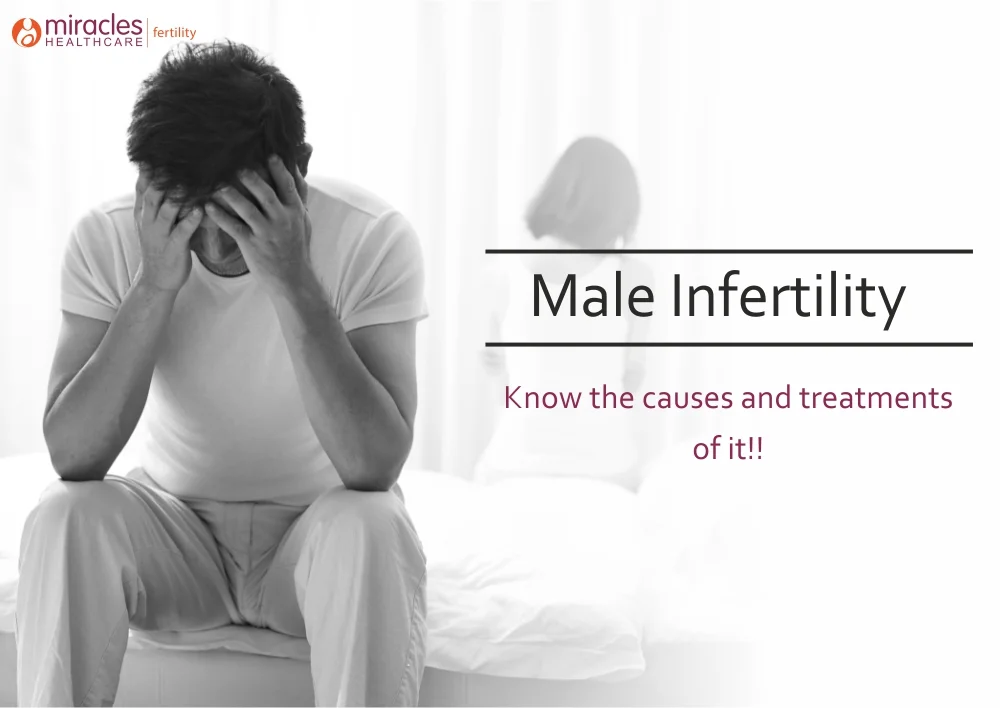Male infertility: What you need to know?
Summary: Male infertility is a significant factor in 30% of infertility cases, often going unnoticed until a semen analysis is performed. Causes include infections, varicocele, undescended testicles, and lifestyle factors. Treatment options range from lifestyle changes to advanced procedures like IUI, IVF-ICSI, and surgical sperm retrieval. Early diagnosis and treatment can significantly improve the chances of conception. Miracles Fertility & IVF Clinic offers specialized care to help men overcome infertility and achieve their dream of parenthood.
Infertility is commonly associated with women, but it is essential to recognize that male infertility plays a significant role in the inability to conceive. It is estimated that 10% to 15% of men experience fertility issues, and male factors contribute to 30% of infertility cases, with an additional 20% of cases where male factors are involved alongside female infertility issues.
Male Infertility Definition
According to the best fertility doctor in Gurgaon at Miracles Fertility & IVF clinic, Male infertility usually presents no symptoms, which makes it challenging to detect without proper testing. Most cases are identified when a semen analysis is performed as part of the infertility evaluation. In fact, before performing invasive tests on women, semen analysis is routinely recommended in infertility clinics to assess male fertility.
To get accurate results, the semen sample should be provided after abstaining from sexual activity for 2-3 days. The primary factors assessed during a semen analysis include:
-
Sperm count: The quantity of sperm found in the semen.
-
Sperm motility: The ability of sperm to swim and move effectively.
-
Sperm morphology: The physical characteristics of the sperm.
Symptoms of Male Infertility
Male infertility generally does not show clear symptoms, but some signs may indicate fertility problems. These include:
-
Difficulty with Ejaculation: Trouble with releasing semen during intercourse or a noticeable decrease in volume.
-
Pain, Swelling, or Lumps in the Testicles: This could be a sign of infections or varicocele.
-
Low Libido or Erectile Dysfunction: Decreased interest in sex or trouble maintaining an erection.
-
Abnormal Hair Growth or Gynecomastia (Enlarged Breasts): This could indicate hormonal imbalances affecting fertility.
Types of Male Infertility
There are several types of male infertility based on the underlying cause, including:
-
Pre-Testicular Infertility: Caused by hormonal imbalances or genetic factors affecting the sperm production process.
-
Testicular Infertility: Issues with the testes, such as genetic disorders or damage to sperm production cells.
-
Post-Testicular Infertility: Blockages or other problems in the ducts that carry sperm from the testes to the urethra.
Male Infertility Reasons
Male infertility can arise from a variety of factors, including issues with sperm production, blockages in sperm transport, or problems related to ejaculation.
-
Infections: Conditions such as mumps can affect the testes, impairing sperm production.
-
Varicocele: Enlarged blood vessels around the testicles, which can raise testicular temperature and negatively impact sperm production.
-
Undescended Testicles: When the testicles fail to drop into the scrotum, it may lead to infertility.
-
Lifestyle Factors: Habits such as excessive alcohol consumption, smoking, drug use, and a sedentary lifestyle can harm sperm production.
-
Hormonal and Genetic Conditions: In some rare cases, hormonal imbalances or genetic factors can lead to male infertility.
Male Infertility Diagnosis
A semen analysis is generally the first step in diagnosing male infertility. It provides a comprehensive picture of sperm health, which helps in determining the best course of treatment. If sperm abnormalities are found, further tests may be recommended to understand the underlying cause, such as hormone testing, genetic screening, or an ultrasound to detect potential blockages.
Treatment Options for Male Infertility
While male infertility may seem confusing, there are several treatment options available. The right treatment plan will depend on the cause and severity of the fertility issue.
-
Lifestyle Modifications: For men with mild infertility, making healthy lifestyle changes can significantly improve semen quality. A balanced diet rich in vitamins and antioxidants, regular exercise, and avoiding harmful substances like alcohol, tobacco, and recreational drugs can enhance fertility. This approach is especially effective in improving sperm motility and count.
-
Intrauterine Insemination (IUI): If the semen analysis shows moderate sperm abnormalities, Intrauterine Insemination (IUI) may be an effective treatment. During IUI, the sperm is washed and concentrated, then injected directly into the uterus at the time of ovulation. This method increases the chances of fertilization but may not be effective for men with severe sperm issues.
-
IVF with ICSI (In Vitro Fertilization- Intracytoplasmic Sperm Injection): In cases where sperm parameters are severely compromised, IVF with ICSI offers hope. Even when only a limited number of healthy sperm are present, an embryologist can inject one sperm directly into an egg during the IVF process. This highly effective technique increases the chances of conception and provides men with the possibility of becoming fathers to their biological children.
-
Surgical Sperm Retrieval: For men who have no sperm in their semen due to blockage or poor sperm production, surgical sperm retrieval may be an option. Procedures such as PESA (Percutaneous Epididymal Sperm Aspiration), TESA (Testicular Sperm Aspiration), or TESE (Testicular Sperm Extraction) can extract sperm directly from the testicles. These sperm can then be used in IVF or ICSI.
When to Seek Help for Male Infertility?
If you have been attempting to conceive for over a year without success, it is crucial to seek a professional evaluation. Male infertility can be diagnosed and treated, and advancements in reproductive medicine have made it possible for many men to father biological children despite fertility challenges.
Conclusion:
Male infertility is a common issue that affects many men, yet it remains underdiagnosed due to the lack of symptoms. Semen analysis is a crucial step in identifying male fertility issues, and treatment options like lifestyle changes, IUI, IVF-ICSI, and surgical sperm retrieval provide hope for many couples. If you are struggling with infertility, consult with an expert fertility specialist near you at Miracles Healthcare to explore the best solutions available.














Was the information useful?
0 0